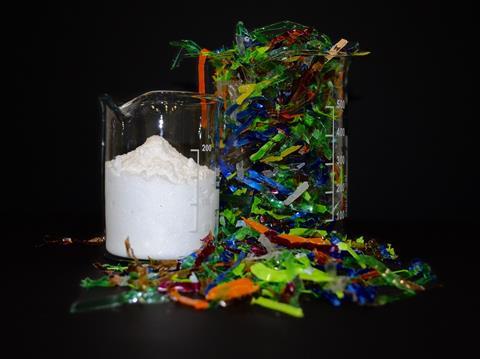
Poseidon Plastics Signs Agreement with DuPont Teijin Films to assist and develop Poseidon’s polyester recycling technology
Poseidon Plastics Ltd., a waste polyester recycling company and co-developers of a unique monomer recycling technology that converts polyester waste to recycled raw material (BHET) to produce virgin PET, is pleased to announce it has signed an MOU agreement with DuPont Teijin Films to assist and develop Poseidon’s Polyester Recycling Technology with a view to constructing an initial 10,000 tonnes per year facility.
The technology had previously operated at 1,000 tonnes per year scale and following a series of process improvements, Poseidon will commercialise its second generation platform (“Poseidon Process”), in the 10,000 tonnes per year plant.
As part of this agreement, DTF will support Poseidon with a range of testing and processing of BHET into PET polymer and BOPET films, as well as its market experience to help Poseidon navigate the regulatory and legislative standards surrounding the industry. Poseidon Plastics, with the help of DTF, intends to construct and operate the 10,000 tonnes per year facility within 18 months in its Teesside base. In parallel with the 10,000 tonnes per year facility, a 50,000 thousand tonnes per year will be designed for subsequent global licensing for larger scale facilities.
The “Poseidon Process” is focussed on recycling problematic waste streams such as trays, pots, containers, fibres/fabrics and all types of polyester composites into consumer grade (r)BHET. Poseidon’s 10,000 tonnes per year facility will start detailed engineering design at the site in Q1 2020.
Martin Atkins, CEO of Poseidon stated, “We are delighted to make this announcement today, and are extremely proud to have taken the “Poseidon Process” to this stage. It is very rewarding to have the recognition from industry leaders as partners, allowing us to learn from their years of experience and know how to expand, accelerate, and scale-up our technology. Completing the supply chain for the circular economy in PET has been one of our major goals focussed on difficult to recycle waste PET materials.”
Dave Wall, Global Technology Director at DuPont Teijin Films stated “We are delighted to be involved in this exciting project and it underlines how important monomer recycling is to DuPont Teijin Films' overall sustainability strategy. We believe that this type of chemical monomer recycling will play an increasingly important role to boost the circularity of PET, opening up new waste streams which currently cannot be economically mechanically recycled, and providing high value end markets for recycled polyester."










